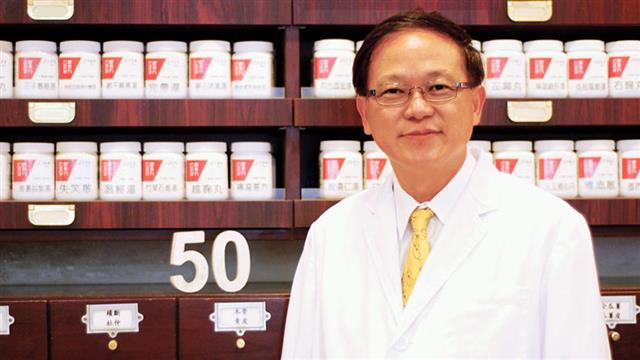You received your bachelor and PhD degrees in biochemistry. What made you switch to Chinese medicine?
At first I didn't know much about traditional Chinese medicine (TCM). While I was teaching biochemistry at CUHK, I participated in Prof. Kong Yun-cheung's studies on TCM including ginseng and Leonurus japonicus. As I became increasingly involved in TCM studies, I became fascinated. I also had first-hand experience as a consumer on its effects on health. I started to take evening courses on TCM, later obtaining the DipChiMed and GradDipChiMed. I took up a teaching post at the Baptist University, which was planning to launch a Chinese medicine programme. I was appointed as the programme director as I had the qualification. From then on, I became a teacher of Chinese medicine.
How is your scientific training useful for your studies in Chinese medicine?
My knowledge in botany and anatomy, etc., helps my understanding of TCM and acupuncture. While some basic knowledge is applicable to both Chinese and Western medicine, there are fundamental differences in theories and approaches between these two disciplines. Chinese medicine regards the body as an organic whole, with interconnected components. It focuses on the balance of the body's organ systems. In Western medicine, the doctor focuses on the components. For instance, from a Western medical point of view, the spleen is a large, vascular, lymphatic organ that acts as a reservoir and filter for blood. In Chinese medicine, the spleen assists in digestion, blood coagulation and fluid metabolism in the body.
The affiliation of the School of Chinese Medicine (SCM) has shifted from the Faculty of Science to the Faculty of Medicine. What does that imply?
Chinese medicine is an arm of the medical system. The shift in affiliation symbolizes a return to the right track. Practically speaking though, the changes have not been that great because all CUHK academic departments enjoy autonomy. There is no change to the school in terms of teaching and research.
What's in the pipeline for the school?
We had a retreat to discuss our development in early July. In the meantime, Chinese medicine students have to complete an 18-month clinical training, the longest one among local Chinese medicine schools. We are thinking of shortening the duration to a year and fine-tuning the Chinese medicine courses. Also, the space of our clinic at the Sino Building will double in size early next year, as the school office will move to the ground and first floors of the Li Wai Chun Building. The expansion will facilitate teaching, research and service to the community.
How does the SCM complement or collaborate with the Faculty of Medicine?
Over the years, the SCM and the Faculty have joined hands in various projects. I, for example, engage in a study on using acupuncture to treat patients with Alzheimer's disease with the Department of Psychiatry. The success of such collaboration depends on mutual respect and having some basic knowledge of the partner's discipline. That said, basic Western medical subjects have been incorporated into modern Chinese medical training, but not the reverse. Being affiliated with the Faculty, I proposed the idea of offering introductory courses in Chinese medicine to medical students to Prof. Francis Chan, Dean of Medicine. In addition, the Faculty is experienced in managing outpatient clinics which are valuable to us in enhancing our service.
What are your views on establishing a Chinese medicine teaching hospital?
I agree with setting up the hospital in principle. It will mean that our students need not undergo clinical training in Shenzhen and Guangzhou. Chinese medicine hospitals on the mainland have different systems and regulations from those in Hong Kong. Students have to adjust themselves throughout the training. Building a Chinese medicine hospital is costly and depends on what the government wants.
What qualities should Chinese medicine students possess? What are their career prospects?
Practitioners in Chinese medicine have to be caring and dare to face illness. It is better if they are interested in Chinese culture as a lot of textbooks are ancient texts. This year marks the 15th anniversary of the SCM. The school is still young. To be honest, the career prospects of the early graduates were less than great. As years went by, their prospects improved. Our graduates are offered three-year working contracts at 17 Chinese medicine clinics under hospitals and NGOs, including the Pok Oi Hospital, Yan Oi Tong, Christian Family Service Centre, United Christian Medical Service, and Haven of Hope Christian Service. After the contract terminates, the students' employment opportunities depend on their performance. Some who performed exceedingly well were sent to Beijing to further their studies.
Any advice for students thinking of studying Chinese medicine?
The Chinese medicine programme has a six-year curriculum. I urge students to evaluate their interest and gather more information before making a decision.
What is your favourite pastime?
I hike, jog, swim, cycle, exercise in the gym and practise tai chi according to the season.



